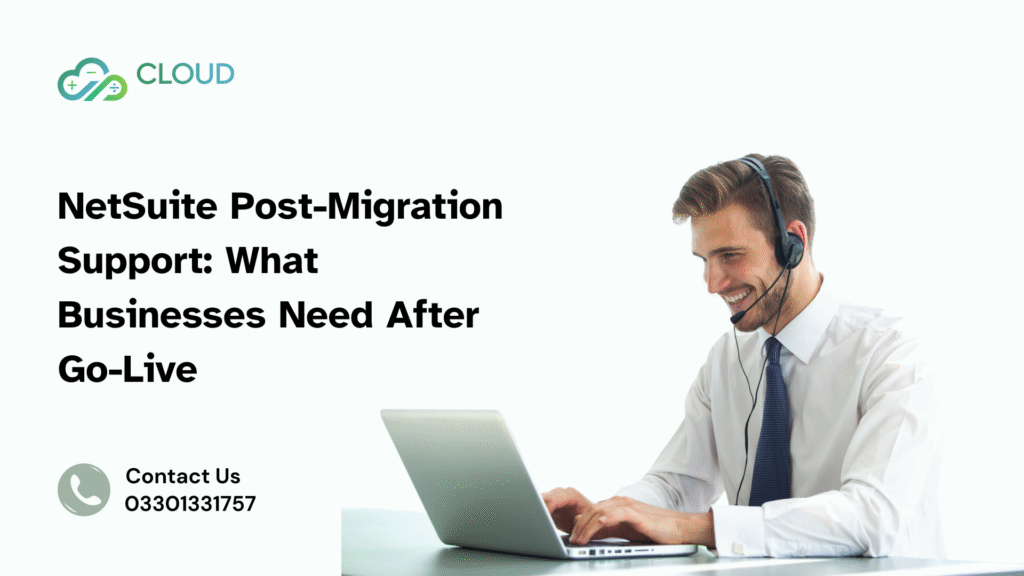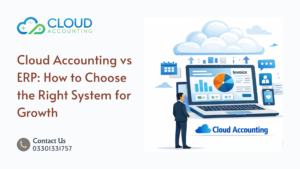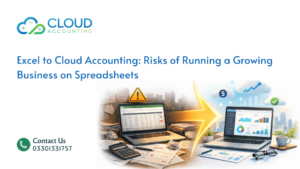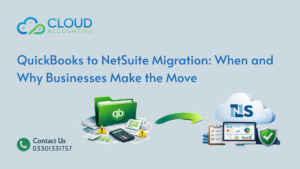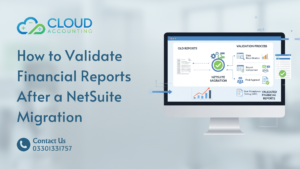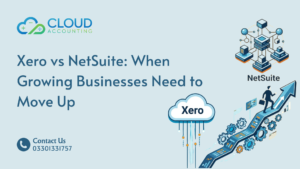For many businesses, moving to NetSuite is a strategic decision to replace outdated systems and unlock new efficiencies. But while the migration project may end at “go-live,” the real work begins afterward. Without dedicated guidance, companies risk losing momentum, seeing employee frustration rise, or failing to capture the full return on investment.
This is where NetSuite Post-Migration Support becomes mission-critical. Rather than treating go-live as the end, forward-thinking businesses see it as the start of a new growth phase. They recognize that ongoing support, training, and monitoring are essential for maximizing NetSuite’s value. With expert help, organizations can quickly resolve early glitches, build staff confidence, and ensure data accuracy, turning migration into measurable success.
Common Issues After Go-Live
The first 90 days after go-live often reveal issues that didn’t surface during testing. These challenges can feel overwhelming, especially for teams that are new to NetSuite. Proactive NetSuite Post-Migration Support helps companies identify and solve them before they snowball into costly disruptions.
Some of the most common go-live challenges include:
- Data mismatches – legacy records not mapping correctly to NetSuite fields, leading to inaccuracies.
- Incomplete reports – dashboards and KPIs may not be fully configured, leaving management without insights.
- User confusion – employees struggle with new processes, permissions, or approval workflows.
- Integration hiccups – errors in syncing with third-party apps such as Shopify, Salesforce, or payroll software.
- System performance slowdowns – especially when high transaction volumes are processed.
- Compliance gaps – missing tax codes or VAT/GST rules, putting businesses at risk during audits.
Businesses that ignore these issues often experience delayed month-end closes, frustrated finance teams, or inaccurate forecasts. On the other hand, those that secure ongoing NetSuite go-live support can:
- Resolve data mismatches in days, not weeks.
- Configure reports correctly to provide instant visibility.
- Train staff quickly to reduce dependence on IT.
- Keep integrations stable to maintain end-to-end workflows.
Training & Support Needs
Adopting a new ERP system requires more than technical implementation it requires cultural adoption. Many businesses discover that their teams hesitate to embrace NetSuite fully, especially if training is minimal. That’s why NetSuite Post-Migration Support emphasizes structured training and ongoing help.
Effective NetSuite training and support typically includes:
- On-demand sessions for urgent issues like fixing a report or understanding a dashboard.
- Scheduled workshops that cover automation, financial reporting, and advanced modules.
- Role-based learning paths so sales, finance, and operations teams receive tailored instruction.
- Internal “super users” who act as in-house champions and support colleagues.
- Knowledge base access with quick guides and troubleshooting tips.
Businesses that prioritize training report higher adoption rates, fewer errors, and faster ROI. Without it, employees often revert to spreadsheets or manual processes, undermining the entire migration.
Another key aspect of post-go-live support is access to ongoing NetSuite support services. Rather than waiting weeks for fixes, businesses can tap into expert consultants who resolve issues in real time. This reduces bottlenecks and keeps teams productive.
Monitoring Performance & Reports
NetSuite’s value lies in its ability to provide real-time data for decision-making. But if performance is not monitored closely after go-live, companies risk inaccurate insights. This is why NetSuite Post-Migration Support must include systematic performance monitoring.
Key post-migration activities include:
- Configuring custom dashboards and KPIs tailored to each department.
- Running regular data validation checks to ensure accuracy.
- Monitoring transaction throughput to prevent performance bottlenecks.
- Setting up alerts for overdue invoices, cashflow risks, or compliance issues.
- Automating scheduled reports for leadership reviews.
Some of the most important KPIs for NetSuite monitoring and optimization are:
- Sales pipeline vs. actual revenue
- Accounts receivable days outstanding
- Expense categorization accuracy
- Inventory turnover ratios
- Vendor payment cycles
By keeping a close watch on these metrics, businesses can identify weaknesses early and adjust processes. For example, a manufacturing company may spot delays in purchase order approvals that slow production. With ongoing NetSuite monitoring, such inefficiencies are quickly flagged and corrected.
How Cloud Accounting Supports Long-Term Success
For most businesses, the real challenge begins after the migration project is technically “finished.” Without structured NetSuite Post-Migration Support, companies risk slipping back into the same inefficiencies they were trying to escape. That’s why Cloud Accounting takes a partnership approach, guiding clients long after go-live to ensure NetSuite becomes a tool for growth, not just another system to manage.
Here’s how our post-migration services help businesses achieve long-term success:
- Custom Reporting & Analytics – Every industry has unique reporting needs. We design dashboards that focus on the metrics that matter whether that’s revenue recognition for service firms, inventory accuracy for retailers, or project profitability for consultancies. This ensures leadership always has reliable, real-time insights.
- Compliance & Audit Readiness – Regulations don’t stand still, and neither should your ERP system. Our team updates NetSuite configurations to reflect the latest tax codes, VAT/GST rules, and reporting standards, keeping your business audit-ready at all times.
- Performance Optimization – As businesses grow, their transaction volumes and reporting requirements expand. We fine-tune workflows, streamline integrations, and optimize system configurations so NetSuite continues to perform at enterprise level, even for SMEs scaling fast.
- Integration Management – Many businesses rely on third-party tools such as Shopify, Salesforce, or HubSpot. Our specialists monitor and refine these integrations, ensuring data flows seamlessly and reducing the risk of sync errors that can disrupt operations.
- Proactive Monitoring & Health Checks – Instead of waiting for issues to escalate, we provide routine NetSuite system reviews. These health checks cover data accuracy, role permissions, and performance metrics, ensuring potential risks are resolved before they affect productivity.
- Dedicated NetSuite Support Services – Clients receive direct access to certified consultants who resolve issues quickly, whether it’s a reporting error, approval workflow, or module configuration. This real-time help keeps teams productive and reduces downtime.
- Strategic Guidance for Growth – Beyond technical fixes, we act as strategic advisors. Whether you’re expanding into new markets, adopting multi-entity structures, or preparing for an acquisition, we ensure your NetSuite environment is configured to support long-term ambitions.
Case Study Example:
One of our wholesale clients struggled with inventory reconciliation after go-live, leading to order delays and frustrated customers. Through Cloud Accounting’s ongoing NetSuite support services, we implemented automated stock valuation reports, retrained staff on order processing, and reconfigured their warehouse workflows. Within two months, the company cut order errors by 70% and improved customer satisfaction scores.
This example demonstrates why NetSuite success is never about the initial setup—it’s about having the right partner to guide you afterward. With Cloud Accounting, businesses get more than troubleshooting. They gain a trusted advisor who ensures NetSuite continues to evolve with their needs, delivering both immediate and long-term ROI.
CTA: Don’t let post-go-live challenges limit your growth. Book a NetSuite Support Consultation today and let Cloud Accounting help you build a future-ready NetSuite system that scales with your business.
Conclusion
NetSuite is a powerful ERP system, but its success depends on what happens after go-live. Data errors, confused users, and incomplete reports can hold businesses back if they don’t have structured support in place. The key to avoiding these pitfalls is investing in expert-led NetSuite Post-Migration Support.
With training, performance monitoring, and dedicated consultancy, companies can transform their NetSuite system into a true growth engine. Cloud Accounting specializes in providing the tailored guidance businesses need to succeed, ensuring NetSuite evolves with them every step of the way.
Don’t leave your investment vulnerable—secure ongoing support and guarantee that NetSuite delivers the long-term results your business deserves.
Ready to protect your NetSuite investment? Book your free NetSuite Support Consultation today and let our experts guide your next steps.

